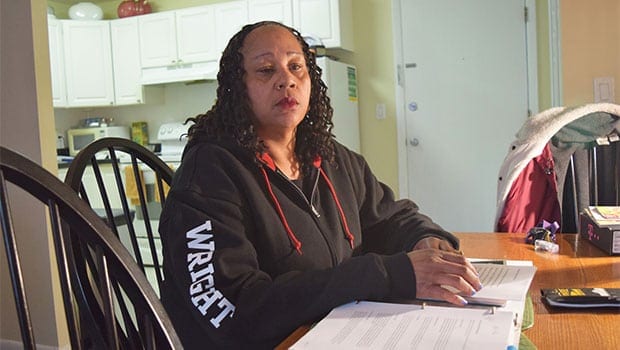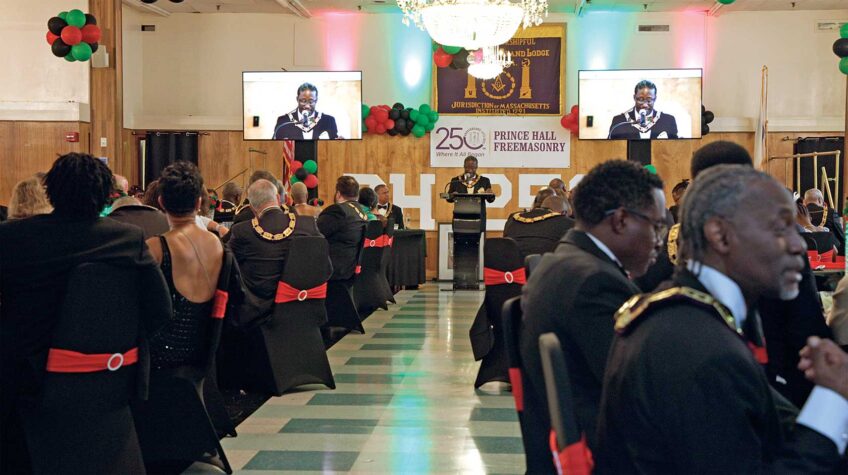A housing profile of a middle-class worker in Boston
Middle-income earners feel shut out in polarized housing market, inequitable city.

Linda Wright works full time as a secretary for the Boston Public Schools system and describes herself as a “put-together, law-abiding citizen who pays her taxes” — but she’s uncertain about where she will be living three months from now.
She is currently paying nearly 40 percent of her take-home pay for a one-bedroom apartment in Dorchester, in a building owned by Kensington Investment Company. In July, her rent will go up from $1,450 to $1,550, an amount Wright says she will not be able to afford.
Like so many middle-class workers, Wright is stuck. She can’t afford current market-rate housing in Boston but she does not qualify for subsidized housing. As someone who was born in Boston and has lived here her entire life, she feels like one of the forgotten, like the city is telling her “get out, get out,” she says.
This scenario is common throughout the city, with the average rent for all apartments at $3,016, according to data compiled by RENTCafe, an online property listing service. The average rent for a one-bedroom across the city is $2,797 and in Dorchester, the average rent for a one-bedroom is $2,533.
Wright doesn’t plan to leave — not without exhausting every option she may have, including entering Boston’s affordable housing lotteries or going through the Boston Home Center, the city’s first-time homebuyers office.
After seeking help from the city’s Office of Housing Stability, Wright entered multiple lotteries for income-restricted housing, only to be told months later that she was “over-income.”
“All the lotteries are for someone who’s not me,” she says.
According to numbers provided by the city’s website, middle-income households are broadly defined as earning between $50,000 and $125,000. Earning less than $50,000, households become eligible for government housing assistance.
Household size is taken into account, and Wright is currently a one-income household. Wright’s gross annual income is around $55,000, but after paycheck deductions for retirement, life insurance, health insurance and union dues, her net annual income is closer to $45,000.
According to city of Boston’s affordable housing standards, when considering Wright’s net income, her maximum affordable rent for a studio apartment should be $1,395.
Wright tells the Banner that although she may not be considered low-income enough by the city, she is additionally burdened with debt incurred from her late mother’s funeral costs.
“My mom died in 2016. She didn’t have life insurance, my sister didn’t keep up with it. So we all had to pitch in and I had to take out a loan,” she says. Her debts roughly total to $155 per month.
On her own
Before moving into the KIC apartment building four years ago, Wright lived in a house that her uncle owned in Mattapan for 45 years. When her uncle passed away, the rest of his family moved to South Carolina and she moved on to live in Dorchester. “The rent was $1,250, I was settled, coming out of a big place to an apartment. I was happy living by myself for the first time,” she says.
Rising rent
During her second year on the lease, the landlord started charging tenants for heat. In the third year, rent increased by $25, but by the fourth year, the rent went up a whopping $175. Another $100 increase is due in July.
Wright says she’s barely making the current rent. “I’m behind on February’s rent,” she says.
Some of her neighbors have also struggled to keep up, many of them moving out or leaning on their families for support.
“I don’t have anyone to fall back on,” said Wright, who says most of her family has passed away.
Wright says she is considering any alternative options, including sharing an apartment with roommates, getting a second job or buying a home. With a pre-approved loan from her bank, as well as a loan from her union, SEIU Local 888, Wright says, “I think I can pull it off with that.”
And even if Wright does find a new apartment, she fears that “without rent-control, the rents will continue to go up and up, I might as well stay here,” she says.
She’s on three different waiting lists for mixed-income apartments, including Dorchester’s Treadmark building, a new 83-unit development located near Ashmont Station. Wright says the wait is three-to-five years.
The Treadmark has 51 designated-affordable rental units available for those earning up to 60 percent of the AMI and four condominium units that meet the city’s Inclusionary Development Policy of 80-100 percent of the AMI. Sheila Dillon, the city’s chief of housing and director of the Department of Neighborhood Development told the Banner for a previous article that Boston’s AMI figure is currently at $55,000. This happens to be Wright’s gross annual income, making her eligible for one of the four condominium units.
“My story is my story,” says Wright. “I don’t know how many other people are in this same predicament, but I’m trying to help myself.”





